
*
In the hit new Matthew Perry sitcom "Go On," Laura Benanti's character, Lauren Bennett, may have dubious resume and no formal training to lead a grief support group (she touts her experience working for Weight Watchers!). But in real life, few would question Benanti's qualifications. Before the actress' role as an earnest counselor to a group of grieving misfits, Benanti made her mark as a star on the Great White Way, with eight Broadway shows and four Tony award nominations under her belt. In 2008, she captured the Best Featured Actress in a Musical prize for her transformative turn as Louise in Gypsy, in which she made an indelible mark alongside the legendary Patti LuPone. But with her camera-ready beauty, gorgeous green eyes, and flowing auburn hair, perhaps it was inevitable that Benanti would eventually turn her sights to television or film.
Yet Hollywood has dragged Benanti on a bit of a roller coaster ride over the past few years. After lining up alongside LuPone in a promising 2010 television pilot called "Open Books" that CBS declined to pick up, Benanti landed the role of bunny den mother Carol-Lynne on the '60s-era NBC drama "The Playboy Club." However, the series was panned by critics, opened to woeful ratings, and was promptly cancelled after just three episodes. Fortunately, NBC's "Go On" was there to pick her up. The show premiered to more than 16 million viewers during the Summer Olympics. And while the ratings have since tapered off, it's still NBC's highest rated new sitcom. Benanti also popped up last season in a recurring role on "Law & Order: SVU" as Detective Amaro's military officer wife. (In real life, she's married to stage veteran Steven Pasquale, who will be headlining his own TV series this winter — NBC's upcoming Jekyll and Hyde doctor drama "Do No Harm.")
In "Go On," Benanti is one of an oddball cast of characters orbiting around Matthew Perry's wisecracking sports talk-radio host, Ryan King, who joins the support group after his wife's untimely death. (The ensemble also includes theatre veteran Julie White as a flinty lawyer who recently lost her lesbian lover.) At first resistant to therapy, the sarcastic Ryan opens up and embraces his new friends, giving them a much-needed injection of brutal honesty, levity and snarky humor. And while Benanti's character has no formal training as a therapist, the earnest and charming Lauren is working hard toward a degree in counseling, while juggling a day job as a parking valet manager and recently passing her real estate exam.
Here, the 33-year-old Benanti talks about playing "the straight man" in a cast of cutups, the influence of her psychotherapist stepdad, her lifelong love of musicals, and the invaluable guidance she got from LuPone and the late, legendary Gypsy director Arthur Laurents.
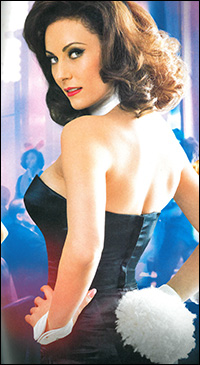 |
||
| Benanti on "The Playboy Club." |
||
| NBC |
Laura Benanti: You know, I think there's a misconception that audiences didn't like "The Playboy Club." But it really was more of an issue of it being boycotted, essentially. There were these special interest groups that were boycotting our advertisers. So by episode three, the only business advertising on our show was Men's Warehouse. It makes me sad that the show went away. But it makes me even more sad that there's this perceived idea that it was just like some failure. It just never had a chance. It was so controversial from the get-go that it really wasn't given a chance to have a full life. I think so many people — reviewers included — were like, "I love that show!" So yeah, that was a bummer that it went away. And then this pilot season, I basically said to my agents and managers, like, "This is it, you guys. This is the last pilot season I'm going to do. I'm not going to turn down Broadway anymore — for the possibility of maybe something happening with a TV series." I sort of gave myself an ultimatum. And thus far it's really worked out, and I'm so very lucky and grateful.
What was the appeal of playing your character on "Go On"? What did you like about the premise of the show, with this wacky group of grief-stricken oddballs coming together in a support group?
LB: I really liked the fact that it was sort of this dramatic premise that was handled really beautifully — with humor and grace. I like that they didn't make fun of support groups. Because it's this sort of ragtag band of misfits who have all been through some type of loss in their life. And who hasn't experienced some kind of loss before? Who can't relate to having something go wrong in your life that's tough for you to deal with? It read to me like a cable show. It was interesting. And I saw a lot of promise in this character. I saw that she's a very empathetic, kind person, with the best of intentions — maybe not all the skills, but the best of intentions. And I ultimately understood and still know that it's going to end up that she needs this group as much as they need her. I just liked the humanity of it.
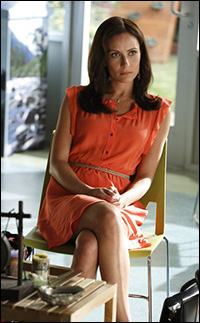 |
||
| Benanti on "Go On." |
||
| Photo by Justin Lubin/NBC |
LB: You know, it's a tough balance to maintain when you have to be the straight man. You also want to be layered and interesting and funny enough that the audiences relate to you. And that's been what the writers and the directors and I have been working toward — keeping Lauren grounded and human, and it being realistic that all of these people would continue to come back to this group to work with her. But to also humanize her, so that she has, you know, quirky, eccentric behavior that is not only amusing but relatable. I think the writers are exploring the idea that the safer Lauren feels in this group, the more she sort of allows her eccentricities to show. Although Matthew Perry is the big name associated with "Go On," it's a real ensemble show. And some of the best shows on TV right now are those big ensemble comedies like "Parks and Recreation," "30 Rock" and "Community." Is that one of the best things about doing this show — being able to work with a such a diverse ensemble of actors? But is it also one of the challenges — having all these mouths to feed and needing to fully develop each of the characters?
LB: Yeah, I think that the tricky, delicate balance of this show is that there is so many of us, that no one person can have the whole storyline — other than Ryan. I also think that's a testament to Matthew — that he's not such an egomaniac that he would force the show to revolve completely around him. But there's like 13 of us or something. So I think that the writers have handled a difficult job really masterfully. You know, it cannot be easy to make sure that everybody gets served in a meaningful way in every single episode. And they manage to do it. So my hat is off to them. And there are no egos in cast. Everybody just gets along really well. And since everyone needs to be served, we all understand there are some episodes where we take a back seat to each other. And what's cool is to see that nobody gets pissed about that. We all get it. Like the Halloween episode was very focused on Yolanda and Owen. The the following episode was focused on Ryan. The episode the week before was focused on Wyatt and my relationship with him. But the Christmas episode is the episode where a big life change happens for Lauren. She makes a big decision that she has a lot of anxiety around.
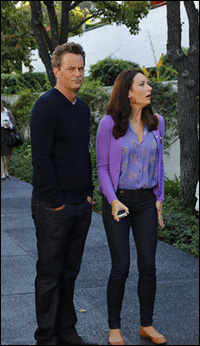 |
||
| Benanti and Matthew Perry on "Go On." |
||
| photo by Vivian Zink/NBC |
LB: He's fantastic to work with. He's very funny. He's very smart. He's a total pro. He's very generous when it comes to his time and his energy. He pitches jokes to people for other characters. He's a really good leader, so we're really lucky. He sets the tone.
Would you ever admit to a celebrity crush on Matthew Perry when he was in his "Friends" heyday?
LB: There's no way for me to answer that question in a way that is okay. So I decline to answer that.
Were you a fan of "Friends"?
LB: Oh, yeah. I was always a fan of "Friends" and a fan of Matthew's. His comedy is so specific and so physical and so smart and interesting. He's one of the funniest men in America. And he's so wonderful on "The Good Wife." So I think people are really getting to see what a fine actor he is, beyond being a hilarious comedian. I like that people get to see that side of him on our show, too — that he can equally handle the tough sad stuff as well as the comedy.
Do you see any romantic chemistry developing between your character Lauren and Matthew's character, Ryan? Can you envision the writers exploring that dynamic down the road?
LB: I don't know. It's certainly not something that's in the forefront of my mind. I think the writers are really interested in Lauren and Ryan's relationship, but not necessarily a romantic one. We're seeing that they have a mutual respect for each other, they're growing to be good friends. But I couldn't say whether or not it would turn into anything else — certainly not anytime soon.
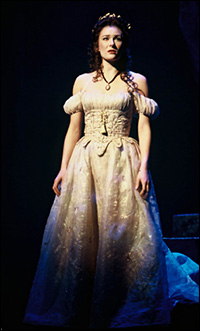 |
||
| Benanti in the 2002 revival of Into the Woods. |
||
| Photo by Joan Marcus |
LB: I've been very lucky to be able to do what I want to do for a living in various branches of the entertainment industry. But I love Broadway. I miss it. I miss the audiences. I miss the camaraderie. I miss being backstage in a ridiculous costume. I miss Tree Sarvay, my dresser. I miss everything. I miss New York. I miss singing. I'm constantly thinking about what I could do next, like on a hiatus. Could I do even like eight weeks somewhere? Because it's in my blood. I'm a gypsy. So I miss it. Not to in any way denigrate my job right now, because I'm so happy — and I love my job so much. But I certainly miss the Life Force that is Broadway. But television was always something you wanted to explore as an actress?
LB: Well, I wanted to try my hand at a different medium. I've been blessed to achieve my childhood dream of being on Broadway when I was 18 years old. I did like eight or nine Broadway shows and won a Tony. And it was so unbelievably exciting. But I just thought, you know, before I age myself out of Hollywood, why don't I try my hand at a medium that I've always been interested in? So that was definitely a conscious decision on my part and one that I was really lucky to be sort of welcomed into. Because that doesn't always happen.
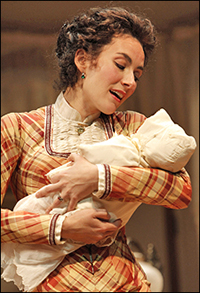 |
||
| Benanti in In the Next Room or the vibrator play. |
||
| photo by Joan Marcus |
LB: Well, when I was 20 years old, I did The Winter's Tale at Williamstown. I played Kate Burton's daughter. [Perdita, daughter of Hermione] And that was a conscious decision on my part. I didn't want to be solely identified as a singer. Not that there's anything wrong with that. But I wanted to cultivate and hone my skills as an actress. Because for me, my favorite actors are actors first — and then singers. Patti LuPone obviously being one of them. The people I admire the most and the people who have the most diverse careers are those who can go back and forth between musicals and plays and television. I just wanted to be as well-rounded as possible. And it's easy to get put into a box in this business. We all want to sort of quantify everything and go, "Okay, this is what you do. And this is what you do." And I didn't want that to happen to me. So I took an active role, along with my agents and my manager to make sure that I continue to diversify myself.
Do you think that doing straight plays helped make you a better actor for the next time you chose to do a musical?
LB: A hundred percent. For me, there's nothing more frustrating than seeing someone who has a beautiful voice not be able to tell the story. Because the thing that I love about musicals is that when you no longer have the words to speak, you sing them or you dance them. But to me, it's only moving if the foundation of the acting is there. Otherwise I might as well just go to a concert. You know, I didn't go to school or college for acting. So it's very important to me to study and take classes and to hone my skills as an actor.
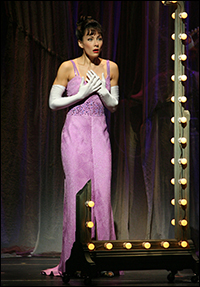 |
||
| Benanti in Gypsy. |
||
| Photo by Joan Marcus |
LB: Oh, wow. He was always so generous and wonderful and helpful to me. You know, he really shifted my acting. He called me out on my bad habits. Because as actors, we all have our sort of bag of tricks that we rely on. And he just really forced me to be honest and truthful. That's the most important thing. You can't be funny, you can't be dramatic, you can't moving, you can't be anything if you're not telling the truth. He really challenged me. And I don't think it's any surprise that I became a better actor once I started working with Patti. Just watching her and learning from her and being around her. It was like going to school. Is there a particularly memorable piece of advice that Patti gave to you? Or something that you observed in her that helped to make you a better actor?
LB: Well, I learned so many things from working with her and watching her: Her commitment to the truth. How thorough she is in the emotional examination of the character. But she did say one thing to me, that's a practical piece of advice, which was, "Just relax and get to the end of the line." Your intention is to just get to the end of the line. Because all the pausing and the hemming and the hawing that we can do in our efforts to be natural are not natural. Just talk. And that's very helpful, especially in television. Because when you're doing theatre, there's an energy that you have to bring onto the stage. There's a certain internal energy you have to have in order to reach the people in the back row. But you don't need to do that on camera. The point is to act like there's no camera there at all, that you're just having a conversation like we are right now.
Your love of musical theatre started at a very young age. Do you remember how it was first sparked?
LB: Well, my mom is a voice teacher, and my dad Marty [Martin Vidnovic] is an actor. And my dad Sal — who is technically my step-dad but I hate that word — is a psychotherapist. So there was a lot of musicals played in my house and a lot of singing in my house. I would go see Marty in his shows, which was a big inspiration for me. And I always watched the movie-musicals, like the Disney movie-musicals. And there was like an open-dialogue in the home where I was raised, in which feelings and emotions were supported. And I'm sure that's thanks in part to my dad Sal and his psychotherapy background. I was always interested in people and characters and why people do things and why people say things and why people behave the way that they behave. But my mom says that when I was three weeks old, she was humming to me, and I started humming with her. Now who knows if that's true. But I sang before I could talk. I don't remember it, but I've seen videos. And I think a lot of it, too, is that my mom is a voice teacher and her studio was in our home. So I would hear her teaching people all day long. And I would sit with her at the piano bench or underneath the piano. And I just always loved musicals.
You mentioned that your dad Sal is a psychotherapist. Was that helpful to you as an actress, in terms of trying to understand and explore the psychology of the characters that you were playing?
LB: Yeah, when I was acting in my high schools shows, Sal would do psychodrama with me, where we would have conversations with myself just as the character, not as Laura. And so I learned to inhabit these characters really fully through his understanding of psychodrama, through his therapy training.
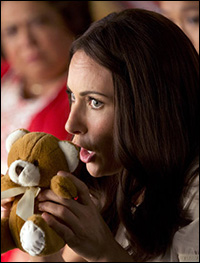 |
||
| Benanti on "Go On." |
||
| Photo by Justin Lubin/NBC |
LB: Yeah, I was. Oh my god, I should send you a picture! No one believes me! And that's why at the cabaret show that I do, I show a poster of myself [when I was young]...I just grew really quickly. I had boobs really quickly. I had really bad skin. I have really curly hair, and I decided to cut it short and then brush it out and give myself bangs. And I always seemed older. I just always seemed more mature than I was. I'm an old soul. So I didn't fit in. Everybody else was listening to Madonna, and I was listening to, like, Rosemary Clooney. I never really felt like I belonged. So that was easy for me to tap into that in playing Louise [in Gypsy]. But when I was like a freshman in high school, I started to pull it all together, and then I started to get attention from boys. But I think I still suffer from that a little bit, where I see something myself very differently from maybe what the world sees. But my husband is like, "I'm glad that you have that complex, because otherwise you'd probably be a jerk." [Laughs.] Did acting in plays in high school help to boost your confidence and break you out of your shell?
LB: Well, I don't think "a lot of confidence" is a phrase that could ever be used for me. But it gave me courage. I act despite my fear.
Do you think that's true for a lot of actors?
LB: Yeah, I think so. I think the most sensitive, empathetic people make the best actors.
Do you have a dream stage role? One that you haven't played yet?
LB: I've always wanted to play Eliza Doolittle in My Fair Lady. But I better get going because I'm not getting any younger.
Will you do a play or musical during your hiatus this summer, assuming that "Go On" gets picked up for another season?
LB: I'm trying to find something and keeping my options open. I don't know what it would be. But I'd like it to be something. Because I sure do miss the stage.









